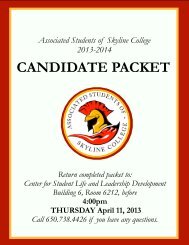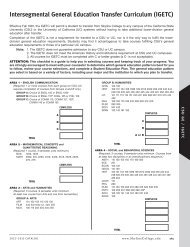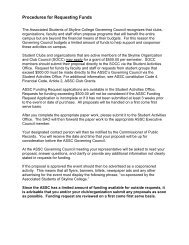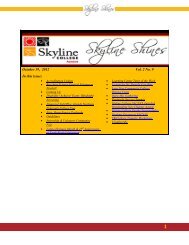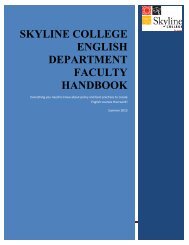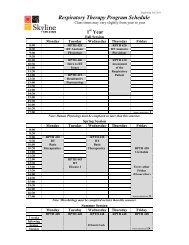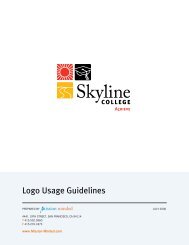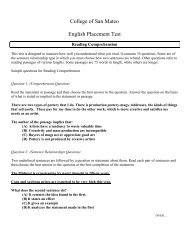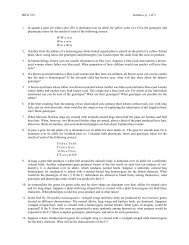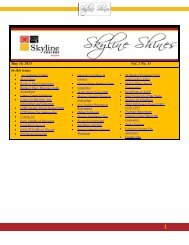Skyline College Catalog 2011-2012 Program & course descriptions ...
Skyline College Catalog 2011-2012 Program & course descriptions ...
Skyline College Catalog 2011-2012 Program & course descriptions ...
Create successful ePaper yourself
Turn your PDF publications into a flip-book with our unique Google optimized e-Paper software.
C O U R S E D E S C R I P T I O N SCOMPUTER SCIENCECOMP 252 PROGRAMMING METHODS II: C++ (3)(Pass/No Pass or letter grade.)Minimum of 48 lecture hours plus 48 lab hours by arrangement/semester.Prerequisite: COMP 250 with a grade of Cor Credit or better, or one full year of C professional programmingexperience, or equivalent.Continuation of <strong>Program</strong>ming Methods I: C++ forComputer Science majors and computer professionals.Topics include advanced class design (inheritance andpolymorphism), data abstraction, templates, containerclasses, pointers and dynamic memory allocation, linkedlists, stacks, queues, trees, recursion, graphs, and sorting/searchingalgorithms. Emphasizes object-orientedfeatures of C++. Transfer credit: UC; CSU.COMP 284 PROGRAMMING METHODS I: JAVA (3)(Pass/No Pass or letter grade.)Minimum of 48 lecture hours plus 48 lab hours by arrangement/semester.Prerequisites: COMP 118 and MATH 120 witha grade of C or Credit or better, or equivalent. Recommended:Eligibility for ENGL 836 or equivalent.Introduction to computer science and web-based programmingusing the object-oriented Java language forComputer Science majors and computer professionals.Includes Java language fundamentals, classes, controlstructures, methods, libraries/API packages, recursion,arrays, strings, vectors, searching, sorting, and exceptionhandling. Transfer credit: UC; CSU.COMP 286 PROGRAMMING METHODS II: JAVA (3)(Pass/No Pass or letter grade.)Minimum of 48 lecture hours plus 48 lab hours by arrangement/semester.Prerequisite: COMP 284 with a grade of Cor Credit or better, or equivalent.Advanced data structures and programming techniquesfor Computer Science majors and computer professionals.Object-oriented approach to a variety of datastructures, including vectors, stacks, queues, linked lists,trees, bags, sets, and graphs. Includes recursion, sortingand searching topics, such as Big O notation and hashtables. Transfer credit: UC; CSU.COMP 312 INSTALLING/USING LINUXAS YOUR PC OS (1.5)(Pass/No Pass or letter grade.)Minimum of 24 lecture hours plus 8 lab hours by arrangement/semester.A first <strong>course</strong> on installing and using Linux as the operatingsystem running on an Intel-compatible PC or workstationcomputer. Topics include creating installationmedia, installing Linux, Linux file system concepts, usingthe graphical desktop interface, beginning shell (commandline) usage, updating the system, and configuringaccess to common network services. After successfulcompletion of this <strong>course</strong>, students will be confidentinstalling and using common Linux distributions (e.g., RedHat, Fedora, SUSE, Ubuntu) on a home or work PC. Alsolisted as TCOM 312. May be repeated once for credit.Transfer credit: CSU.COMP 313 WORKING IN A LINUX SHELLENVIRONMENT (1.5)(Pass/No Pass or letter grade.)Minimum of 24 lecture hours plus 8 lab hours by arrangement/semester.Recommended: Satisfactory completion(grade of C or better) of COMP/TCOM 312, or equivalentexperience using a Linux desktop system.A <strong>course</strong> on using the Linux shell (command line) environment.Topics include comparing the Linux graphicaldesktop environment and the shell environment, shellcommands for file system usage, shell features for productivityand customization (history, completion, aliases,environment files), advanced shell features (regularexpressions, redirection, pipelines), introduction to shellscripts and shell commands for process managementand remote system access. After successful completionof this <strong>course</strong>, students will be confident using the bashshellenvironment found on common Linux distributions(e.g., Red Hat, Fedora, SUSE, Ubuntu). Also listed asTCOM 313. May be repeated once for credit. Transfercredit: CSU.COMP 314 MANAGING A LINUX SYSTEM (1.5)(Pass/No Pass or letter grade.)Minimum of 24 lecture hours plus 8 lab hours by arrangement/semester.Prerequisite: Satisfactory completion (grade ofC or better) of COMP/TCOM 312, or equivalent experienceinstalling or using a Linux system, or equivalent.An intermediate <strong>course</strong> on administering a Linux system.Designed for individuals who have installed Linux butwho now want a hands-on exposure to key concepts,issues and capabilities for managing a Linux system.Topics include installing from alternate media sources(network installs), managing disk devices (defining partitions,creating file systems, and mounting/un-mountingfile systems), creating multi-boot systems and boot loadermenus, using run levels including trouble-shooting withsingle user mode, and maintaining system softwareincluding installing from source code and recompiling kernels.The focus of this <strong>course</strong> is on developing expertisefor managing a given Linux system (as opposed to managingservices provided to other systems). After successfulcompletion of this <strong>course</strong>, students will be confident inmanaging a system with a common Linux distribution(e.g., Red Hat, Fedora, SUSE, Ubuntu). Also listed asTCOM 314. May be repeated once for credit. Transfercredit: CSU.164 w w w. S k y l i n e C o l l e g e . e d u <strong>2011</strong> – 2 012 C ATA L O G



